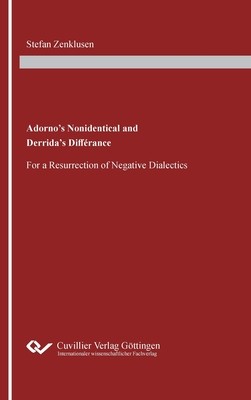
- We will send in 10–14 business days.
- Author: Stefan Zenklusen
- Publisher: Cuvillier
- ISBN-10: 3736973047
- ISBN-13: 9783736973046
- Format: 15.2 x 22.9 x 1.1 cm, hardcover
- Language: English
- SAVE -10% with code: EXTRA
Reviews
Description
The virulent anti-Hegelianism of French poststructuralism and its (difficult) confrontation with Jürgen Habermas has long obscured the closeness of Jacques Derrida's "différance" to Theodor W. Adorno's "Nonidentical." Taking the overarching theme of "identity and difference" as a guide, we can peel apart what unites and separates these two thinkers. In so doing, certain "de-realizing" effects of Derrida's entrapment in signs reveal themselves. By contrast, Adorno's social and cultural diagnosis, when extrapolated to a post-Fordian context is astonishingly fruitful. Attempts to trivialize negative dialectics as a model of intellectual self-understanding from a past age or as an esthetic reserve of ways of life are untenable.
EXTRA 10 % discount with code: EXTRA
The promotion ends in 20d.06:59:11
The discount code is valid when purchasing from 10 €. Discounts do not stack.
- Author: Stefan Zenklusen
- Publisher: Cuvillier
- ISBN-10: 3736973047
- ISBN-13: 9783736973046
- Format: 15.2 x 22.9 x 1.1 cm, hardcover
- Language: English English
The virulent anti-Hegelianism of French poststructuralism and its (difficult) confrontation with Jürgen Habermas has long obscured the closeness of Jacques Derrida's "différance" to Theodor W. Adorno's "Nonidentical." Taking the overarching theme of "identity and difference" as a guide, we can peel apart what unites and separates these two thinkers. In so doing, certain "de-realizing" effects of Derrida's entrapment in signs reveal themselves. By contrast, Adorno's social and cultural diagnosis, when extrapolated to a post-Fordian context is astonishingly fruitful. Attempts to trivialize negative dialectics as a model of intellectual self-understanding from a past age or as an esthetic reserve of ways of life are untenable.


Reviews